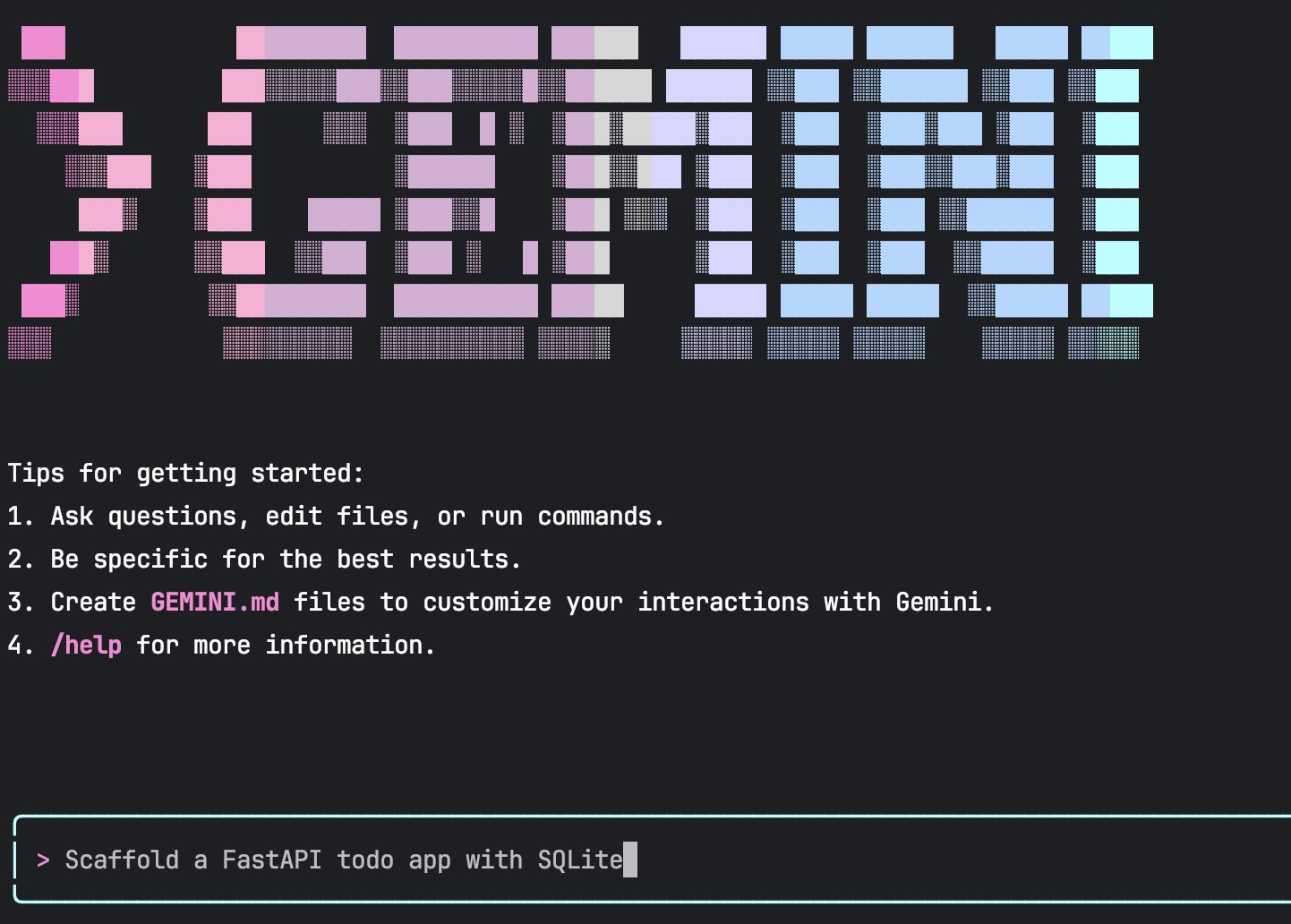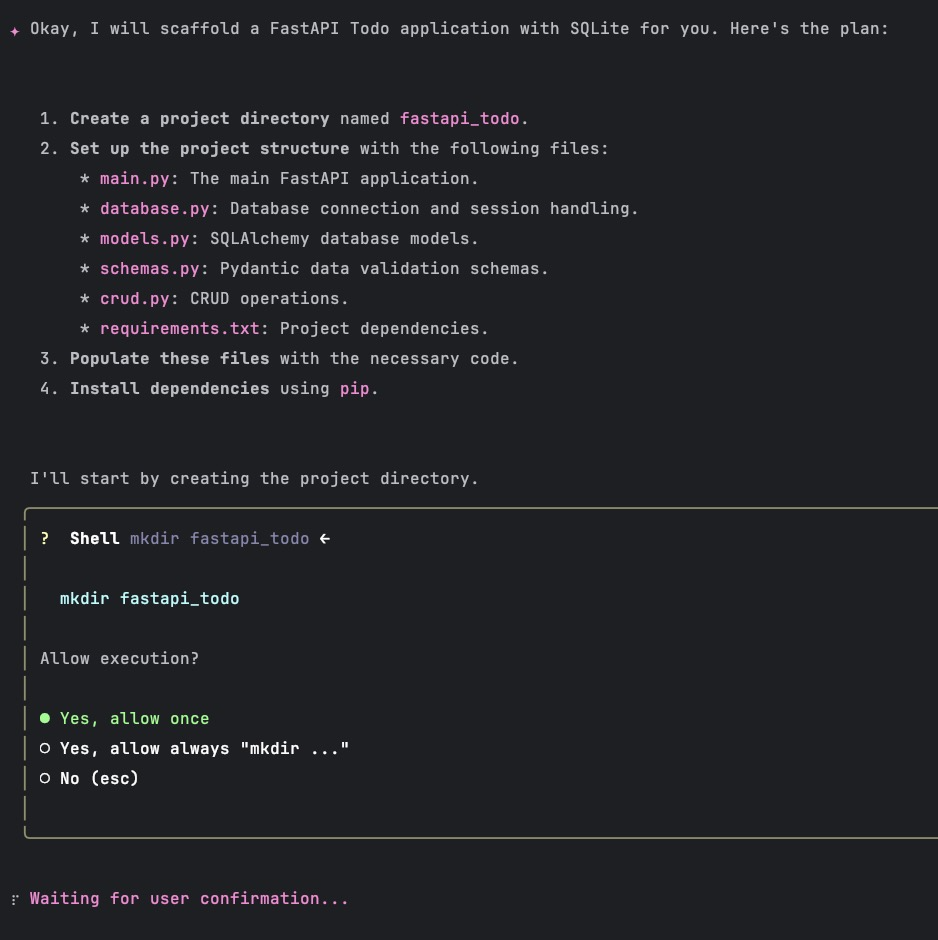How to Supercharge Your Terminal with Gemini CLI
TL;DR
Gemini CLI is Google’s free, open-source AI agent for your terminal. Powered by Gemini 2.5 Pro (with a huge 1 million-token context), it lets you scaffold apps, debug and refactor code, fetch and summarize web content, automate file ops, generate docs or slides, and even build custom chat agents—all via natural-language prompts. Install via homebrew, npx, npm; log in with your Google account for 60 req/min & 1 000 req/day free, or supply an API key for higher quotas and full privacy. Customize per-project behavior with gemini.md and .geminiignore, and extend capabilities through external MCP servers like Imagen, DuckDuckGo or HuggingFace.
Installation
Install the gemini-cli command system-wide.
Homebrew (macOS/Linux):
1
brew install gemini-cli
Install via npx or npm
Prerequisite: Node.js ≥ 18 (check your current node version with node -v).
1
npx https://github.com/google-gemini/gemini-cli?utm_source=genmind.ch
1
npm install -g @google/gemini-cli
Authentication & Privacy
You can use your Google account (for free) or with an API key, here is how and key differences:
- Google-account login (free tier): On first run, pick a color theme then sign in with your personal Google account—no billing setup required. You get 60 model requests/min and 1 000 requests/day at no cost. But here is the caveat: Under the Gemini Code Assist Privacy Notice, prompts & responses may be logged for product improvement (opt-out available).
API-key login (usage-based, full privacy): Generate a key in Google AI Studio, then run:
1
export GEMINI_API_KEY="YOUR_API_KEY"
to switch to API-key mode—enabling higher rate limits, specific‐model access, and no data ingestion for improvements.
Project Configuration
.geminiignore: Exclude files/folders (like logs or large assets) from being read into context—just like.gitignore.gemini.md: Drop this in your repo root to provide persistent “memory” (project rules, styles, or context) that loads automatically each session.settings.json: In.gemini/, configure external MCP servers, default models, or bug filing behavior; see the repo’s docs/cli/configuration.md for details.
Getting Started
In any directory—new or existing—run:
1
gemini
to enter the interactive REPL (gemini>). From here, type natural-language prompts like:
1
> Scaffold a FastAPI todo app with SQLite
If you are planning to use the tool as a code assistant better if you set your default working folder with the @ command eg ‘@/Users/gp/Developer/samples/gemini-cli-test’
and watch it create files, install deps, run tests, and show you the results.
After a while the tool was able to create a fully, almost, working solution. It just forget to create the __init__.py so uviconr was failing to start. A quick look and after 10 seconds the APis were working! Then I asked to create a simple python file to test the APIs. It worked first shot. I asked some more changes to the tested and everything went well. In less than ten minutes I had the solution working and even well organized and architected.
This is the proof that Andrej Karpathy is a visionary and he is totally right about where software development is going see his post from 2017 Software 2.0, and his speech at the AI Startup School in San Francisco Software Is Changing (Again). I’m no one, but I can’t agree more with him, I saw this happening back in 2019 when I gave my first speech about AI AI for every developer
I diverged a bit, but I’m really exited about the coming revolution in software development. Now back to track…
Core Slash Commands & Built-In Tools
Type /tools in the REPL to see everything at your fingertips. Below is the slash-command list:
| Command | Description |
|---|---|
/bug | File a GitHub issue with your current prompt as the title (configurable via settings.json). |
/chat save | Save the current conversation under a named tag. |
/chat resume | Resume a previously saved conversation. |
/clear | Clear the terminal display (same as Ctrl+L). |
/compress | Replace the entire context with a concise summary to save tokens. |
/help | Show general help and usage tips. |
/mcp | List or describe configured Model Context Protocol servers and their tools. |
/memory add | Add a fact to your project memory (persisted via GEMINI.md). |
/memory show | Display all saved memory entries. |
/memory refresh | Re-load memory from GEMINI.md. |
/restore | Roll back all file changes to the state before your last tool invocation. |
/stats | Display token usage, cache savings, and session duration (cached tokens only in API-key mode). |
/theme | Switch the CLI’s color theme. |
/auth | Toggle authentication method (OAuth vs API key). |
/about | Show version info, authentication status, and environment details. |
/quit | Exit the Gemini CLI. |
What You Can Do: Sample Use Cases
Coding Assistant
Prompt:
1
> Generate a Next.js + Tailwind CDN landing page for a pizza by the slice bakery like the ones in Rome.
Outcome: Creates
pages/index.js, links Tailwind from CDN, and scaffolds responsive components.Prompt:
1
> Find and fix failing pytest tests in tests/test_user.py.
Outcome: Applies patch edits, runs
!pytest, and reports success.
Research & Summaries
Prompt:
1
> Web-fetch "https://techcrunch.com" and save summaries of the top 5 AI articles to ai_summaries.txt.
Outcome: Downloads pages, extracts headlines, writes summaries via
write-file. (datacamp.com)
Content Generation
Prompt:
1
> Draft a 500-word GenMind.ch blog post on the latest trends in LLM fine-tuning.
Outcome: Outputs a structured draft ready to copy into your CMS.
Automation & DevOps
Prompt:
1
> !for f in *.png; do convert "$f" "${f%.png}.webp"; doneOutcome: Batch-converts all PNGs to WebP via shell integration.
Slide Decks
Prompt:
1
> Create a 5-slide PowerPoint deck summarizing last week’s Git commits by author.
Outcome: Uses a Python script under the hood to parse
git logand outputsdeck.pptx. (datacamp.com)
6. Custom Agents (ADK)
Prompt:
1
> Using DuckDuckGo MCP, scaffold an ADK agent that answers questions about this codebase.
Outcome: Generates
agent.py, Docker setup, and config foradk web. (cloud.google.com)
Advanced: Extending with MCP Servers
- Configure
.gemini/settings.jsonwith your MCP endpoints (e.g., Imagen, DuckDuckGo, Hugging Face). - Install local clients (
pip install duckduckgo-mcp-server). - List with
/mcp listand describe with/mcp desc. Invoke in prompts, e.g.:
1
> /mcp huggingface-image generate an illustration of a data scientist
Tips & Best Practices
- Use
gemini.mdto seed long-term context and project rules. (cloud.google.com) - Lean on
web-fetchand/searchfor real-time facts. - Persist insights with
/memory add. - Avoid token bloat via
/compresson stale context. - Monitor limits daily with
/statsto stay under free quotas.
Wrap-Up
Gemini CLI brings an incredibly versatile AI assistant to your terminal—whether you’re coding, researching, automating, or building agents. It’s free to try, simple to install, and endlessly extensible. Give it a spin:
1
brew install gemini-cli
For full docs and the source code, check out the GitHub repo and the official docs.
Happy prompting!
Need Help with Your AI Project?
Whether you’re building a new AI solution or scaling an existing one, I can help. Book a free consultation to discuss your project.

